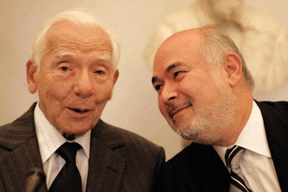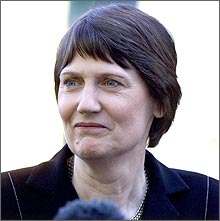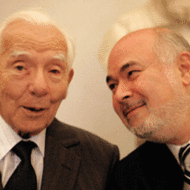Dear Friend:
The Global Security Institute joins in offering condolences and support to the survivors of the recent tsunami. In the midst of an inspiring outpouring of caring for those injured by world’s worst natural disaster of modern times, where thousands have died and millions remain at risk, at the Global Security Institute (GSI) we reflect on how to prevent such devastation from occurring in the future. Natural disasters cannot be prevented – their impact only minimized. On the other hand we can and must prevent the unspeakable catastrophes looming before us that will certainly occur without effectively constraining and eliminating nuclear weapons.
Hiroshima and Nagasaki resulted in over 220,000 deaths. The devices used were small compared to the tens of thousands now available in today’s arsenals. No one can adequately compare or quantify enormous disasters fully. Every particular individual life represents a universe of ultimate value, grace and wonder.
The tsunami was triggered by an earthquake. Uses of nuclear weapons are triggered by human fingers guided by misguided policies. Foremost among them is the silent ongoing threat of nuclear weapons attack as a means to secure peace through terror. Second is the excessive expenditures in money and human capital to maintain the threat. If but a small portion of the billions wasted (over $39 Billion per year in the U.S. alone) were spent on promoting human security, sustainable development and alleviation of poverty, security would be enhanced the world over. Our capacity to work for the least among us would be so much greater. This is the work for peace in the larger context.
In our view it is not enough just to contemplate the supreme value of peace, but it is necessary to commit to working for it. GSI’s work on nuclear disarmament has arisen out of such underlying principles of peace and dedication. In this context I would like to share with you some of our recent work.
 Alyn Ware, International Coordinator for the Parliamentary Network for Nuclear Disarmament (PNND) and I represented the International Peace Bureau at the Summit of Nobel Peace Laureates in Rome, which was convened by the Gorbachev Foundation and the City of Rome. Mr. Ware gave an inspiring presentation on the need for peace education in schools, while I had the honor of chairing both a six-hour session on “Terrorism and Threats to Humanity,” and the closing press conference. GSI Advisory Board Members President Mikhail Gorbachev, Rigoberta Menchu-Tum and Sir Joseph Rotblat participated along with more than twenty other Nobel Peace Laureates and Laureate organizations. Most meetings were working sessions not open to the public, however there was substantial television and media coverage, although not in the United States. Congressman Ed Markey, Co-Chair of the U.S. House of Representatives’ Bipartisan Task Force on Nonproliferation presented the Statement of the Peace Laureates to his colleagues in the U.S. Congress. The Statement is comprehensive and represents the forward thinking of some of the world’s most courageous visionaries. I commend it strongly to your attention. A full report of the Summit, along with transcripts of GSI’s submission and those of other participants is available on our website.
Alyn Ware, International Coordinator for the Parliamentary Network for Nuclear Disarmament (PNND) and I represented the International Peace Bureau at the Summit of Nobel Peace Laureates in Rome, which was convened by the Gorbachev Foundation and the City of Rome. Mr. Ware gave an inspiring presentation on the need for peace education in schools, while I had the honor of chairing both a six-hour session on “Terrorism and Threats to Humanity,” and the closing press conference. GSI Advisory Board Members President Mikhail Gorbachev, Rigoberta Menchu-Tum and Sir Joseph Rotblat participated along with more than twenty other Nobel Peace Laureates and Laureate organizations. Most meetings were working sessions not open to the public, however there was substantial television and media coverage, although not in the United States. Congressman Ed Markey, Co-Chair of the U.S. House of Representatives’ Bipartisan Task Force on Nonproliferation presented the Statement of the Peace Laureates to his colleagues in the U.S. Congress. The Statement is comprehensive and represents the forward thinking of some of the world’s most courageous visionaries. I commend it strongly to your attention. A full report of the Summit, along with transcripts of GSI’s submission and those of other participants is available on our website.
Click here to read the Nobel Peace Laureates’ Statement.
Click here to read GSI’s reports on the Nobel Summit.
Click here to read an account of the Summit in the Congressional Record.
 The Middle Powers Initiative (MPI) convened a forum at the United Nations in early November, “New Implications for the Nuclear Nonproliferation Treaty 2005 Review.” The Right Honourable Kim Campbell, former Canadian Prime Minister, chaired the event, and panelists included Hon. Douglas Roche, O.C., Chairman of the Middle Powers Initiative; Ambassador Robert T. Grey Jr., Director of the Bipartisan Security Group; and John Holum, former U.S. Undersecretary of State. The informative forum concluded with a dialogue between panelists and participants, made up of ambassadors, delegates, and political counselors from more than 20 countries including Australia, Brazil, Canada, Germany, Ireland, Japan, Mexico, New Zealand, Poland, and Switzerland.
The Middle Powers Initiative (MPI) convened a forum at the United Nations in early November, “New Implications for the Nuclear Nonproliferation Treaty 2005 Review.” The Right Honourable Kim Campbell, former Canadian Prime Minister, chaired the event, and panelists included Hon. Douglas Roche, O.C., Chairman of the Middle Powers Initiative; Ambassador Robert T. Grey Jr., Director of the Bipartisan Security Group; and John Holum, former U.S. Undersecretary of State. The informative forum concluded with a dialogue between panelists and participants, made up of ambassadors, delegates, and political counselors from more than 20 countries including Australia, Brazil, Canada, Germany, Ireland, Japan, Mexico, New Zealand, Poland, and Switzerland.
Click here to read a report on the MPI Forum at the United Nations.
 The PNND continues to grow with more than 300 parliamentarians from 50 countries participating and using the network to enhance their nuclear non-proliferation and disarmament activities. Recent PNND events include a forum held in the New Zealand parliament on December 8 that brought together parliamentarians from Africa, Asia, Europe, the Americas, the Middle East, and the Pacific to discuss parliamentary actions to establish and strengthen nuclear weapon free zones and support the Nuclear Non-Proliferation Treaty. Prime Minister Helen Clark and Minister of Disarmament Marian Hobbs gave outstanding presentations.
The PNND continues to grow with more than 300 parliamentarians from 50 countries participating and using the network to enhance their nuclear non-proliferation and disarmament activities. Recent PNND events include a forum held in the New Zealand parliament on December 8 that brought together parliamentarians from Africa, Asia, Europe, the Americas, the Middle East, and the Pacific to discuss parliamentary actions to establish and strengthen nuclear weapon free zones and support the Nuclear Non-Proliferation Treaty. Prime Minister Helen Clark and Minister of Disarmament Marian Hobbs gave outstanding presentations.
Click here to read the speech by Prime Minister Clark.
Ambassador Grey, Director of the Bipartisan Security Group (BSG), and I recently traveled to the Netherlands, had very productive meetings with the Foreign Ministry and began planning a conference at the Clingendael Institute for March of 2005. We anticipate a substantial gathering with policy makers and members of Parliament.
During a tour of European capitals in late February and March, which will include a stop at the Clingendael in the Netherlands, Senator Roche will present a brief arising out of an extraordinary strategy consultation co-hosted by MPI and The Carter Center this January 26-28th with President Carter and key diplomats. The purpose of these meetings is to develop policies and strategies that preserve and strengthen the Nuclear Non-Proliferation Treaty and help fulfill its mandates relating to both nonproliferation and disarmament.
Click here to read a report on MPI’s 2000 Consultation at The Carter Center.
The American Bar Association’s International Law Section has again honored us with organizing the Showcase presentation at its yearly meeting. Last year I hosted a dynamic dialogue with Robert McNamara and Ted Sorensen. This year Ambassador Thomas Graham, Chairman of the Bipartisan Security Group and myself will conduct a panel on the current status of the Nuclear Nonproliferation Treaty. Senator Cranston’s long time friend and former Director of the Central Intelligence Agency, Admiral Stansfield Turner, will join us. The event will be in Washington, DC on April 14, 2004.
Click here to view Robert McNamara and Ted Sorenson in conversation.
Through our four programs — MPI, BSG, PNND and DPE — GSI is working with passion and resolve to ensure that humanity heeds the clear warning of Nagasaki and Hiroshima: never again!
Our prayer, our passion, and our commitment to work to achieve a secure, sane, and peaceful world arises from both the practical requirements of national and international security and the vision that our common humanity, in this critical historical moment, requires engagement. The greatest threat today is the callous indifference to unnecessary suffering arising from crushing poverty, harm to the living systems of the Earth, and the horrific threat of nuclear weapons. This indifference corrodes the character of the privileged and ensures negligence in responding to the needs of others, especially future generations. The universal response of care to a natural disaster reminds us that this callous indifference can and must be overcome in addressing manmade problems.
GSI’s intentional focus to promote the moral, legal and practical steps needed to achieve the elimination of nuclear weapons is guided by this deeper sense of responsibility to work for peace. We know that many more hearts and hands than appear in the newspapers are working based on this same sense of responsibility, and we believe that this sense arises from the deepest part of our hearts, the place where peace is valued the most.
For this coming year, it is our hope that our actions succeed in effectively honoring this highest of human values — peace.
Very truly yours,
Jonathan Granoff
Jonathan Granoff is the President of the Global Security Institute, a representative to United Nations of the World Summits of Nobel Peace Laureates, a former Adjunct Professor of International Law at Widener University School of Law, and Senior Advisor to the Committee on National Security American Bar Association International Law Section.








